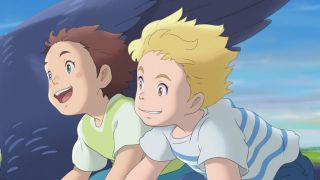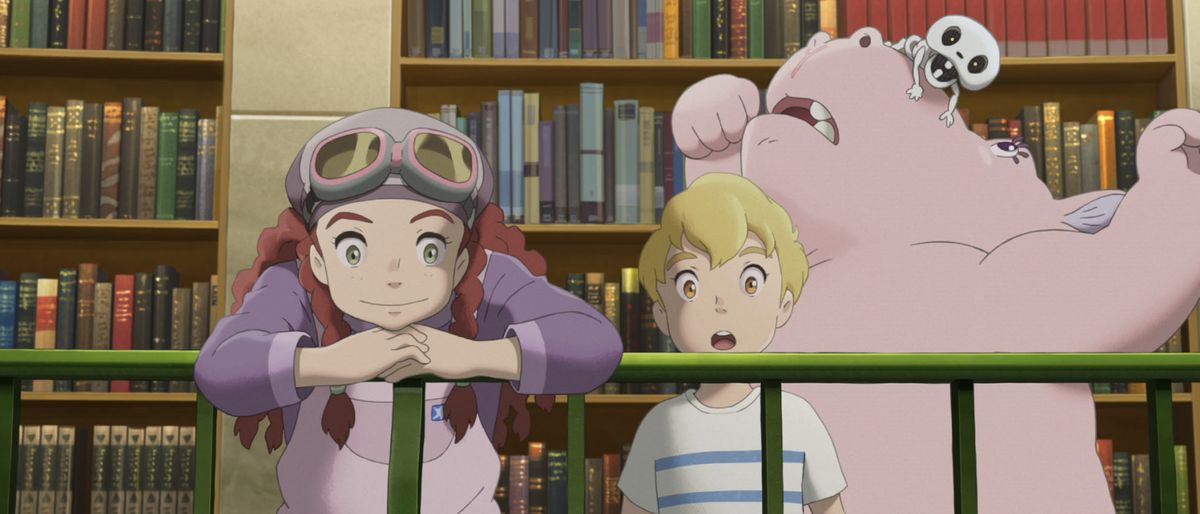The more I look at the calendar of movies for the year, the more surprised I am to see so many projects centered around the subject of imagination. Though the subject is inherently limitless, audiences could find themselves burned out with Imaginary, IF, and Harold and the Purple Crayon all showing up within 2024. I hope people can put that burnout aside when it comes to director Yoshiyuki Momose’s new animated spectacle The Imaginary, as this particular tale is full of such bittersweet whimsy that it’s as profound and sentimental as it is action packed.
The Imaginary

Release Date: July 5, 2024
Directed By: Yoshiyuki Momose
Written By: Yoshiaki Nishimura
Starring (English Voice Cast): Louie Rudge-Buchanan, Evie Kiszel, Hayley Atwell, Sky Katz, Jeremy Swift, Kal Penn, LeVar Burton, Jane Singer, Ruby Barnhill, Roger Craig Smith, Courtenay Taylor, and Miles Nibbe
Rating: PG for scary images, peril, thematic elements and some violence.
Runtime: 108 minutes
Based on the 2014 children’s book from author A. F. Harrold and illustrator Emily Gravett, The Imaginary takes us once more into the world of imaginary friends. In this instance, however, the focus is on young Amanda (Evie Kiszel) and the Imaginary Rudger (Louie Rudge-Buchanan) as they hit an important milestone in their relationship.
This moment comes at a time when Rudger’s life is threatened by a serious threat, prompting him to have to learn more about how Imaginaries work when they don’t have a dedicated child to look after. It may seem like a lot when reading a rundown, but the way that writer Yoshiaki Nishimura’s adaptation plays this story is effortless. It’s also incredibly moving, and when I say you’ll need tissues handy, I’m not being hyperbolic.
In a year when imagination is a popular subject, The Imaginary cleverly plays into the charms of such a story.
Explaining a “secret world” can be an exciting prospect in a cinematic adventure, but it can also get bogged down in storytellers potentially getting too cute and clever in the details. Of course, with Studio Ponoc’s pedigree of being founded by The Imaginary’s writer/Studio Ghibli’s former lead producer Yoshiaki Nishimura, the latter is an issue that never rears its head in the film.
The subject of imaginary friends doesn’t feel stale within NIshimura’s script and Yoshiyuki Momose’s direction. There is certainly a specific world, but it’s not overly burdened with rules that are meant to set up callbacks or plot loopholes. At the same time, those details are naturally played throughout The Imaginary’s adventure as Rudger learns more about himself and the world around him through his fellow figments of fancy.
While there’s plenty to get wide eyed about when discovering this world, it doesn’t get tiring. People can only “discover” things for so long before the novelty of that sort of quest wears off, leading a sort of sugar crash after those initial flashes of beauty. There’s such great care taken with Rudger and Amanda’s friendship in the opening act of The Imaginary that by time circumstances separate them for an extended spell of the picture, we’re just as interested in Rudger’s solo quest as we were when he was paling around with his “real” friend.
Mixing Western pop culture sensibilities with Eastern storytelling sensibilities leads to a unending supply of bittersweet whimsy.
There’s a scene in The Imaginary where Rudger and his fellow Imaginaries take a trip into a young boy’s playtime adventures that really hammers home this film’s impressive level of detail. While a space opera familiar to any of us who grew up as Star Wars fans plays out, the young man’s spaceship has a high tech look to its controls and consoles, but also looks to be made of cardboard.
That approach is emblematic of what The Imaginary tries and succeeds in doing. While it’s a very glossy sequence than includes the child running the show humming “Also Sprach Zarathustra,” the nature of the scenario is never taken for granted. A mixture of pop culture references and humor from Western storytelling melds together with the Eastern sensibilities we’ve seen in countless animated films that tackle heavy subject matter suitable for all audiences.
You could also apply that praise to the fact that, much like other English-language dubs, The Imaginary has some star power in its cast. In particular, Kal Penn’s street cat Zinzan offers sage guidance to Rudger, helping him every step of his journey of self discovery. With LeVar Burton and Hayley Atwell contributing further dramatic gravitas to an impressive voice cast on both sides of the Imaginary divide, both whimsy and heartbreak are well served, and neither emotion feels overridden or devalued by the presence of the other.
The Imaginary is a heartfelt contender to be one of the best animated films of the year.
Through a story that walks through the childhood practice of imaginary friends, The Imaginary always has the potential endgame firmly in view. Rudger and Amanda both get to process the eventuality that, sooner or later, their adventures together will come to a natural end. That catharsis is built into every exciting world they choose to visit, as well as every threat that tries to separate them prematurely.
We’re not told to put on our blinders and wait for the emotional wallop waiting at the end of The Imaginary, but rather the audience is conditioned to accept that fate every step of the way. As a result, the peril and the pathos shine equally bright, which more than likely explains why the more outrageous adventures throughout hold their worth.
For a movie that seems to have a limitless imagination, The Imaginary never forgets to pair that with empathy and emotional intelligence, making it one of the best animated films this year has to offer so far.
